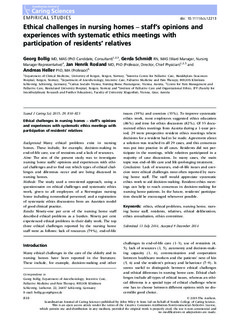| dc.contributor.author | Bollig, Georg | |
| dc.contributor.author | Schmidt, Gerda | |
| dc.contributor.author | Rosland, Jan H. | |
| dc.contributor.author | Heller, Andreas | |
| dc.date.accessioned | 2020-01-27T12:53:43Z | |
| dc.date.available | 2020-01-27T12:53:43Z | |
| dc.date.issued | 2015 | |
| dc.identifier.citation | Bollig, G. (2015b): Ethical challenges in nursing homes – staff’s opinions and experiences with systematic ethics meetings with participation of residents’ relatives. Scandinavian Journal of Caring Sciences 29(4), 810–23. | nb_NO |
| dc.identifier.uri | http://hdl.handle.net/11250/2638087 | |
| dc.description.abstract | Background
Many ethical problems exist in nursing homes. These include, for example, decision‐making in end‐of‐life care, use of restraints and a lack of resources.
Aims
The aim of the present study was to investigate nursing home staffs’ opinions and experiences with ethical challenges and to find out which types of ethical challenges and dilemmas occur and are being discussed in nursing homes.
Methods
The study used a two‐tiered approach, using a questionnaire on ethical challenges and systematic ethics work, given to all employees of a Norwegian nursing home including nonmedical personnel, and a registration of systematic ethics discussions from an Austrian model of good clinical practice.
Results
Ninety‐one per cent of the nursing home staff described ethical problems as a burden. Ninety per cent experienced ethical problems in their daily work. The top three ethical challenges reported by the nursing home staff were as follows: lack of resources (79%), end‐of‐life issues (39%) and coercion (33%). To improve systematic ethics work, most employees suggested ethics education (86%) and time for ethics discussion (82%). Of 33 documented ethics meetings from Austria during a 1‐year period, 29 were prospective resident ethics meetings where decisions for a resident had to be made. Agreement about a solution was reached in all 29 cases, and this consensus was put into practice in all cases. Residents did not participate in the meetings, while relatives participated in a majority of case discussions. In many cases, the main topic was end‐of‐life care and life‐prolonging treatment.
Conclusions
Lack of resources, end‐of‐life issues and coercion were ethical challenges most often reported by nursing home staff. The staff would appreciate systematic ethics work to aid decision‐making. Resident ethics meetings can help to reach consensus in decision‐making for nursing home patients. In the future, residents’ participation should be encouraged whenever possible. | nb_NO |
| dc.publisher | Scandinavian Journal of Caring Sciences | nb_NO |
| dc.rights | Attribution-NonCommercial-NoDerivatives 4.0 Internasjonal | * |
| dc.rights.uri | http://creativecommons.org/licenses/by-nc-nd/4.0/deed.no | * |
| dc.subject | ethics | nb_NO |
| dc.subject | ethical problems | nb_NO |
| dc.subject | nursing home | nb_NO |
| dc.subject | nursing home staff | nb_NO |
| dc.subject | residents | nb_NO |
| dc.subject | relatives | nb_NO |
| dc.subject | ethical deliberation | nb_NO |
| dc.subject | ethics consultation | nb_NO |
| dc.subject | ethics committee | nb_NO |
| dc.title | Ethical challenges in nursing homes – staff's opinions and experiences with systematic ethics meetings with participation of residents’ relatives | nb_NO |
| dc.type | Journal article | nb_NO |
| dc.source.pagenumber | 810-823 | nb_NO |
| dc.source.volume | 29 | nb_NO |
| dc.source.journal | Scandinavian Journal of Caring Sciences | nb_NO |
| dc.source.issue | 4 | nb_NO |
| dc.identifier.doi | https://doi.org/10.1111/scs.12213 | |

